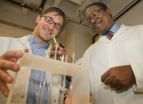(Press-News.org) PROVIDENCE, R.I. [Brown University] — Seemingly healthy adults, if they were abused or neglected during childhood, may suffer physiological consequences decades later. In research published online last week by the journal Neuropsychopharmacology, a team led by psychiatrists at Brown University and Butler Hospital found that healthy adults who reported being mistreated as kids appear to have an elevated inflammatory response to stress compared to adults who had happier childhoods.
Lead author Linda Carpenter, associate professor of psychiatry and human behavior, said that prior research has revealed preliminary associations between inflammatory markers, (such as cytokines or proteins released in the bloodstream such as interleuken-6) and depression and anxiety disorders, so this new finding could ultimately improve doctors' understanding of how stressors in childhood shape the risk people face for developing those conditions later in life.
"Animal models have given us some signals about how the functioning of an organism's stress response system can run amok for the rest its life as a result of some of the earliest environment exposures — adverse ones in particular," said Carpenter, who also treats patients with mood disorders at Butler. "This is one of a number of studies we've been doing with generally healthy adults, looking at the effects of adverse early environment and how it might create a biological abnormality that could predispose somebody to future depression or another medical disorders."
A study in 2006 at Emory University had shown that men who were mistreated as kids and were now struggling with symptoms of depression as adults had an elevated inflammatory response to stress, Carpenter said. The goal of her team in this pilot study was to find out whether the same is true of adults who endured early life adversity, but are not experiencing psychiatric disorders like depression. The results supported the idea that people who struggled with childhood abuse and neglect have exaggerated immune system reactions later in life, Carpenter said, perhaps in dicating a trajectory toward future health challenges.
Stress test
To conduct the research, the team recruited 69 adults, ranging in age from their late teens to early 60s. After administering a battery of tests to ensure that the subjects were psychiatrically healthy and not taking any medicines or drugs that would bias the results, the team surveyed them extensively about their childhood experiences. Of the group, 19 reported moderate to severe neglect or abuse.
To measure each group's inflammatory response to stress, the researchers then asked them to undergo a laboratory role-play called the Trier Social Stress Test, in which they had to appear before a panel of "judges" and both speak about their qualifications for their job and then count backward from a number by 13s. All the while, the researchers were measuring various vital signs and collecting blood samples.
Among the subjects who reported adverse childhood experiences, the concentrations of interleukin-6 in their blood were always elevated above those of the control group, and the gap widened considerably as the subject recovered from the psychological stress during several hours after the role-play.
Advancing disease understanding
Further research is necessary — for instance, expanding this small study to incorporate a larger sample size, Carpenter said. That, combined with more work exploring the connection between immune system function and depression, could eventually lead to a blood test that would be used to assess a patient's risk for developing depression or other medical disorders. It might also guide the choice of treatments or prevention measures.
"We're not yet at a point,where we can say to healthy people 'Go get your stress-test cytokine profile done' as a tool to prevent, diagnose, or treat medical disorders," she said. "But what's clear is that a life of excessive stress-induced inflammatory chemicals in your bloodstream is unlikely to be a good thing."
In the future, the way to help some patients, Carpenter added, might be in finding ways to ratchet down that inflammatory response to stress.
INFORMATION:
In addition to Carpenter, other authors were Lawrence Price and Audrey R Tyrka, professor and assistant professor, respectively, of psychiatry and human behavior, with appointments at Butler hospital; Brown graduate student Cyrena Gawuga; Butler researcher Janet Lee; and Yale University researcher George Anderson.
Editors: Brown University has a fiber link television studio available for domestic and international live and taped interviews, and maintains an ISDN line for radio interviews. For more information, call (401) 863-2476.
Childhood adversity may lead to unhealthy stress response in adult life
2010-10-08
ELSE PRESS RELEASES FROM THIS DATE:
New study shows benefits of Bt corn to farmers
2010-10-08
A group of agricultural scientists reported in today's issue of the journal Science that corn that has been genetically engineered to produce insect-killing proteins isolated from the soil bacterium Bacillus thuringiensis (Bt) provides significant economic benefits even to neighboring farmers who grow non-transgenic varieties of corn.
"Modern agricultural science is playing a critical role in addressing many of the toughest issues facing American agriculture today, including pest management and productivity," said Agriculture Secretary Tom Vilsack. "This study provides ...
Stem cells shape up to their surroundings
2010-10-08
London, UK (October, 07, 2010) –Many scientists aspire to take control over the stem cell differentiation process, so that we can grow organs and implants perfectly matched to each patient in the future. Now research in the Journal of Tissue Engineering, published by SAGE-Hindawi, explains how engineering the topography on which stem cells grow, and the mechanical forces working on them, can be as powerful an agent for change as their chemical environment.
Stem cells respond to the stiffness, chemistry and topography of the environments they find themselves in – and scientists ...
Election forecasts favor Republican gains in midterm
2010-10-08
WASHINGTON, DC-In the weeks leading up to the 2010 midterm elections, five forecasters or teams of forecasters offer models and predictions for the House in the most recent issue (October 2010) of PS: Political Science and Politics, a journal of the American Political Science Association. The models offer a broad consensus that the Republicans will make substantial gains in the House, although there is not a consensus over how large those gains will be. A 30-seat spread between the low and high end of the seat change forecast range exists, with two forecasters giving an ...
Structure of plastic solar cells impedes their efficiency
2010-10-08
A team of researchers from North Carolina State University and the U.K. has found that the low rate of energy conversion in all-polymer solar-cell technology is caused by the structure of the solar cells themselves. They hope that their findings will lead to the creation of more efficient solar cells.
Polymeric solar cells are made of thin layers of interpenetrating structures from two different conducting plastics and are increasingly popular because they are both potentially cheaper to make than those currently in use and can be "painted" or printed onto a variety ...
Stanford-led study disproves link between genetic variant, risk of coronary artery disease
2010-10-08
STANFORD, Calif. — A genetic marker touted as a predictor of coronary artery disease is no such thing, according to a study led by researchers at the Stanford University School of Medicine.
The massive international study, published online Oct. 7 in the Journal of the American College of Cardiology, assessed the predictive value of a leading genetic assay for risk of atherosclerosis.
The study analyzed the data from more than 17,000 patients with cardiovascular disease and 40,000 others to assess whether carrying a particular variant of the KIF6 gene indicated a greater ...
New tool in the fight against tuberculosis
2010-10-08
Researchers at the Institute for Genomic Biology at the University of Illinois have developed a way to harness the prodigious quantities of both genomic and metabolic data being generated with high-throughput genomics and other techniques. They have developed an algorithm that automatically integrates both data sets. The model, called probabilistic regulation of metabolism (PROM), enables researchers to perturb a given regulatory gene or metabolic process and see how that affects the entire network.
"PROM provides a platform for studying the behavior of networks in a ...
Thoughts about time inspire people to socialize
2010-10-08
Does thinking about time or money make you happier? A new study published in Psychological Science, a journal of the Association for Psychological Science, finds that people who are made to think about time plan to spend more of their time with the people in their lives while people who think about money fill their schedules with work, work, and—you guessed it—more work.
To find out how thinking about time or money makes people feel, Cassie Mogilner of the University of Pennsylvania designed an experiment, carried out online with adults from all over the United States, ...
Brown University chemists simplify biodiesel conversion
2010-10-08
PROVIDENCE, R.I. [Brown University] — As the United States seeks to lessen its reliance on foreign oil, biodiesel is expected to play a role. According to the National Renewable Energy Laboratory, a branch of the Department of Energy, biodiesel "represents a significant energy resource and could someday supply 3 percent to 5 percent of the distillate fuel market."
One major obstacle to achieving that goal is figuring how to efficiently convert the abundant stocks of waste vegetable oil (oil used after cooking French fries, for example) into biodiesel fuel. Current techniques ...
Melanoma uses body's immune system to spread to lungs
2010-10-08
The way melanoma cells use the immune system to spread and develop into lung tumors may lead to a therapy to decrease development of these tumors, according to Penn State researchers.
"Melanoma is the most aggressive and metastatic form of skin cancer," said Gavin Robertson, professor of pharmacology, pathology, dermatology and surgery in the Penn State College of Medicine. "Therefore, identifying proteins and molecular mechanisms that regulate metastasis is important for developing drugs to treat this disease."
Metastasis is a complex process in which cancer cells ...
MIT researchers develop a better way to see molecules at work in living brain cells
2010-10-08
CAMBRIDGE, Mass. -- By creating a better way to see molecules at work in living brain cells, researchers affiliated with MIT's Picower Institute for Learning and Memory and the MIT Department of Chemistry are helping elucidate molecular mechanisms of synapse formation. These studies could also help further understanding of how synapses go awry in developmental diseases such as autism and Fragile X syndrome. The study will appear in the Oct. 7 issue of Cell.
Using the new technique, which is more accurate and sensitive than existing methods, the researchers found that ...

